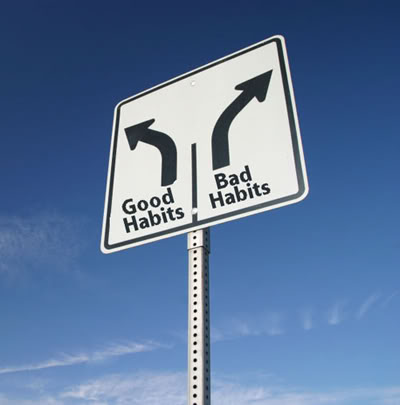This post is the first in a series about developing good habits with money.
No one wants to worry about money as a college student. Tuition is high enough.
Then, of course, when you factor in living expenses like food, books, phone bills, transportation, and other miscellany, like laundry, beer and coffee… the list goes on, and things get expensive.
When it comes to personal finance if students take the time to compare checking accounts, credit cards, and savings accounts they can set themselves up for financial success! If not… well students should be prepared to suffer from overage draft charges and mounds of credit card debt. The best way to avoid the latter: develop good habits.
In this series we’ll talk about what good habits you need to develop as a college student to be smart with your money.
Good Habits With Credit Cards
 Credit cards are one of the most expensive ways to use your money. Why? They are like very high interest loans that charge interest for short time use.
Credit cards are one of the most expensive ways to use your money. Why? They are like very high interest loans that charge interest for short time use.
Instead of banks loaning a larger amount of money that will be paid back over a longer period of time, as with traditional loans, credit card owners are expected to pay the money back at the end of each month.
For college students, mismanagement of a credit card can mean many problems after graduation.
Developing good habits with credit cards, or avoiding credit cards entirely, will help you avoid:
1. Being a 30-something still paying off a student credit card.
2. Having a bad credit score when you’re older due to credit card problems you had in college, which could stop you from financing an apartment rental, a new car, or even cause issues with future employment.
The college student population has shown to be particularly fickle with their use of credit cards. Only 17 percent of college students paid their bill regularly each month, according to Consumer Reports. The good news, however, is that there are more regulations now to help protect college students from falling into debt from credit card problems.
First, develop good habits with your checking account to manage your cash – keep detailed records, and be conscious of your financial situation. Then, once you’ve developed those good habits, you might consider a credit card.
Still, if you decide that you need a credit card immediately, a student credit card is always an option. These cards offer special point systems and cash back rewards for students.
But be careful of deals that seem too good to be true. Good habits to develop: always ask questions, be skeptical and be diligent with your financial planning.
The cards displayed below are for those who’ve already developed smart spending habits. If you are in the ranks of the 17% of students who pay their bill on time (or think you can be) congratulations because credit card is a great means of building your credit. If you build a solid credit history you’ll gain lower interest rates on big-ticket items later, such as a car or home (no its not to early to think about buying a home).
You can find a comparison of all credit cards at FindTheBest.
In my next post I’ll discuss habits on money saving to build up your savings, and also give you some options if you’re over your head in debt (hopefully you’re not).
This article was a collaborative between Thomas Samph and Kyle Espinola. Thomas is a recent Graduate of Boston University and Kyle is a senior at the University of California, Santa Barbara. Both Thomas and Kyle work for FindTheBest.com, an unbiased data-driven comparison designed to help you find the information on anything from the presidential candidates to venture capital firms.


